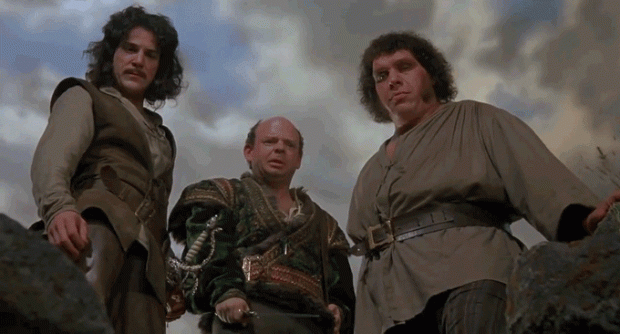 In my family, the 1987 film “The Princess Bride” is something of a tradition. I showed it to our kids early (perhaps too early for the younger ones) and we watch it often. For better or worse, references to its many memorably lines now punctuate conversations in our house. But there is one trope in the movie that I think of more frequently in the office than at home, and that is the recurrent “inconceivable” line.If you haven’t seen the film, you really should. Meantime, for purposes of this post, you need to know that the great Wallace Shawn plays Vizzini, a bumbling villain who is hired to do some dirty work on behalf of the vain and ambitious Prince Humperdink, who leads a fictitious city-state in perhaps the 16th or 17th century. Vizzini enlists a swordsman and a giant to help him kidnap Princess Buttercup with the intention of killing her. The swordsman, a Spaniard named Iñigo Montoya, and the half-witted giant Fezzik are played memorably by Mandy Patinkin and the late professional wrestler Andre the Giant, respectively. The trio’s work is proceeding according to plan until the film’s hero Westley, masked and wearing black from head to toe, catches on to their plot and begins to trail them in the hope of rescuing the princess, his True Love.
In my family, the 1987 film “The Princess Bride” is something of a tradition. I showed it to our kids early (perhaps too early for the younger ones) and we watch it often. For better or worse, references to its many memorably lines now punctuate conversations in our house. But there is one trope in the movie that I think of more frequently in the office than at home, and that is the recurrent “inconceivable” line.If you haven’t seen the film, you really should. Meantime, for purposes of this post, you need to know that the great Wallace Shawn plays Vizzini, a bumbling villain who is hired to do some dirty work on behalf of the vain and ambitious Prince Humperdink, who leads a fictitious city-state in perhaps the 16th or 17th century. Vizzini enlists a swordsman and a giant to help him kidnap Princess Buttercup with the intention of killing her. The swordsman, a Spaniard named Iñigo Montoya, and the half-witted giant Fezzik are played memorably by Mandy Patinkin and the late professional wrestler Andre the Giant, respectively. The trio’s work is proceeding according to plan until the film’s hero Westley, masked and wearing black from head to toe, catches on to their plot and begins to trail them in the hope of rescuing the princess, his True Love.
Each time Iñigo and Fezzik express concern that the Man in Black is gaining on them, Vizzini proclaims confidently that performing the acts of daring and strength required to close the gap would be, in a word, “inconceivable!” The Man in Black, of course, goes on to perform each of the “inconceivable” acts. This confuses Iñigo, who finally says to Vizzini: “You keep using that word. I do not think it means what you think it means.”
I can identify with Iñigo’s cognitive dissonance. In my conversations with colleagues about the growing supply of “sustainable” coffees in the marketplace, I often find myself thinking: “You keep using that word. I do not think it means what you think it means.”
The volume of coffees in the marketplace branded “sustainable” has steadily increased as the evidence of acute environmental and economic pressure on coffee farming has mounted. The sustainable coffee market has boomed even as many growers are on the brink of a bust:
- Climate change is reducing the suitability of many origins for coffee production and increasing the frequency and virulence of coffee diseases;
- Prices are highly volatile and often fail to cover growers’ costs of production;
- Notwithstanding the robust public extension services of a few coffee institutes and some innovative private-sector extension schemes, smallholder growers mostly fail to access the agronomic, financial and enterprise development services they need to compete;
- Smallholder farming families dependent on coffee for their livelihoods, including many selling “sustainable” coffees, still cope with chronic food scarcity;
- Young people born into coffee-farming families are increasingly seeking their futures off the farm in industries that are more profitable, less risky and less difficult than coffee farming;
- If things are bad for growers, they may be even worse for workers: low pay and limited protections for farmworkers have led to annual labor shortages at harvest time in some parts of the coffeelands.
If sustainability in coffee includes the idea that coffee growing as we know it today can be sustained over time—and I think it does—these realities seem to undermine the integrity of the sustainable coffee storyline and the value of the term “sustainable coffee.”
This is not a new idea. People have been questioning the sustainability of “sustainable” coffees since they appeared on the market. But in recent months, a number of thought leaders in coffee and sustainability have also expressed concern about the way the term is being used and measured.
In preparing this rock-star panel at The SCAA Event, I shared my observation about The Princess Bride’s “inconceivable” trope and found it resonated with most of the sustainability leaders on the panel.
At the SCAA Symposium in Seattle, COSA founder Daniele Giovannucci suggested that in our push for sustainability we should be measuring impacts rather than process. Many coffees are branded “sustainable” because the way they were produced and/or traded checks enough boxes on a scorecard to meet a third-party certification or a corporate code of conduct—not because the farmers who grow them are profitable and competitive or because the coffee landscapes they maintain are biodiverse and building natural capital.
And at Re:co Symposium in Gothenburg in June, the International Coffee Organization’s Director of Operations Mauricio Galindo said we have used the term “sustainable” so much that we have effectively stripped it of all meaning.
The credibility of the term will decline if it continues to be applied to coffees grown by farmers who are poor and hungry, in degraded landscapes or against a backdrop of accelerated climate change. Even worse, the use of the term could continue to expand as fewer farmers grow coffee and less of the washed Arabicas that have been the bedrock of specialty coffee find their way to market.
As you read these dire assessments, I suspect that many of you are thinking like Vizzini: “Inconceivable!”
Michael Sheridan
Michael Sheridan is the Chief Executive Officer of the Coffee Quality Institute, a nonprofit organization with a mission to improve coffee quality and the lives of those who produce it. Sheridan has been leveraging market forces to make coffee work for smallholder farmers and farm workers since 2004. Most recently he directed progressive green coffee sourcing activities and direct-trade partnerships at Intelligentsia Coffee. Prior to that he worked to deliver initiatives in the coffee sector in Central and South America on behalf of Catholic Relief Services.







Comment